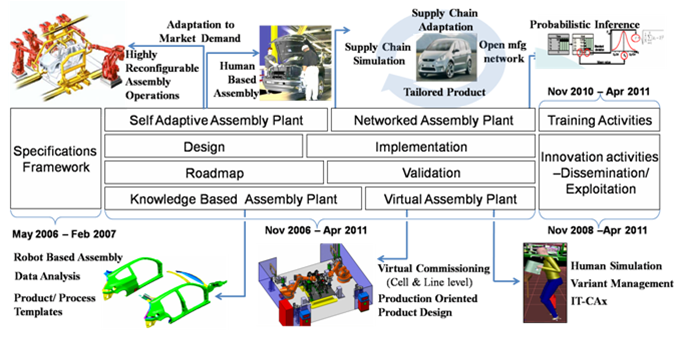MyCar
- contact:
- project group:
WG1: Process Engineering
- funding:
EU FP6 NMP | NMP2-CT-2006-026631
- startdate:
05/2006
- enddate:
04/2011
Flexible assembly processes for the Car of the Third Millennium
MyCar
Problem Description
Nowadays, continuously decreasing lifecycle times of car models and increasing number of variants, require from automotive manufacturers to design and operate assembly plants and production networks that are completely flexible, capable of switching from producing one model to another in order to meet fluctuating and diverse demand. A key issue for the European automotive industry to succeed in such diverse, complex and customer driven market-context will be to produce on-demand products of high complexity eliminating costly disturbances and changes during operation, while improving quality and product-service life cycles.
Objectives
MyCar is advancing the way modern vehicles are assembled, enabling an ultimate degree of customization, which could, in its outmost extent, allow every customer to purchase a unique vehicle. This paradigm will be formed on the basis of the self-adaptive assembly plant. MyCar will further develop and integrate technologies that will facilitate the vehicle assembly process into becoming self-adaptive to any kind of market variation and capable of producing cars with extended degree of personalization. MyCar aspires at improving the ability of the automotive industry to integrate the customer into its assembly processes.
The research and development activities are organised around the four subprojects, as follows.
- Self adaptive plant, aims to enable the production system at plant level to be self-adaptable in order to accommodate diversified customer needs. This concept integrates emerging technologies such as: RMS/RAS, in-line robots, manual, automated and mixed assembly lines, fixtureless assembly, mini robots for clamping, in-line instructions to support operator adaptability and other emerging technologies.
- Virtual Assembly Plant, integrates assembly simulation technology (virtual prototyping, robots kinematics, human factors, product design, process simulation, production network simulation) and enables designers and engineers to test new car/truck designs and assembly concepts prior to their physical implementation.
- Networked Assembly Plant, adaptability enablers include: supply chain management and inventory control approaches, RFID, ICT technologies for data exchange (e.g. XML, STEP, web services, semantic web), supply chain simulation and probabilistic modelling of market behaviour.
- Knowledge-based Assembly Plant, includes and extends beyond state of the art, tools that assist operational and design decisions towards self-adaptability; such tools include: mathematical models for correlating process and parameters with product quality, product templates, assembly process integration and closing the loop from design to final product.

Organizational Information:
Coordinator:
Mr. Bert Hill, Volvo Technology
bert hill ∂does-not-exist.volvo com
Project manager:
Dr. Sotiris Makris, LMS
makris ∂does-not-exist.lms mech upatras gr
Consortium:

















